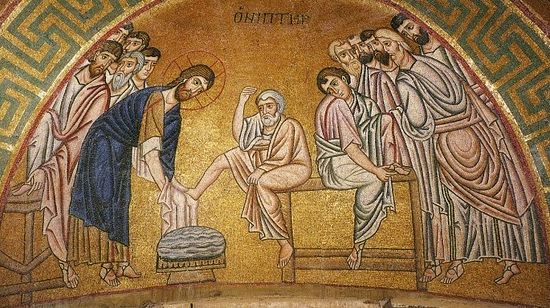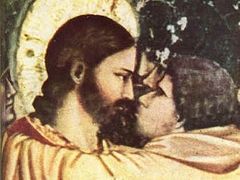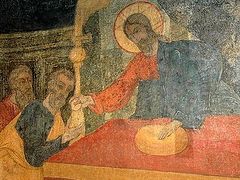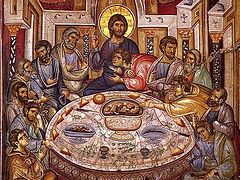Today, brothers and sisters, on Great and Holy Thursday we remember the Last Supper, when our Lord Jesus Christ established the Sacrament of Holy Communion, and served the first Divine Eucharist, giving his disciples and apostles His Most Pure Body and Blood in the image of bread and wine.
The services of Great Lent are filled with Old Testament images and symbolic stories, many of which prophetically point to the great gift of Christ’s Holy Mysteries, through which mortal man, easily inclined toward sin, enters into communion, into the closest union with his Creator and Redeemer.
At the Vespers we have just served, we heard the story of God’s Prophet Moses’s ascent on Mt. Sinai. There God appeared to him in the sound of thunder and the flash of lightening. But the prophet and God-seer could not converse with God face to face, for the veil of the Old Testament had not been removed from his eyes. Nevertheless, as the prefiguring of the future Sacrament of Communion, to Moses and the people of Israel was sent manna—heavenly bread, which filled them in the desert.
According to the words of the Psalmist David, the Lord rained upon them manna to eat, and gave them the bread of heaven. Man ate the bread of angels (Ps. 78 23-25). And Christ speaks of old Israel: Your fathers did eat manna in the wilderness, and are dead. And he continues about the new grace: This is the bread which cometh down from heaven, that a man may eat thereof, and not die (Jn. 6:49-50).
Exegetists of Holy Scripture see in the bread and wine with which the mysterious priest of the Most High God Melchisedek, who was a sign of Christ, met Abraham, as the prefiguring of the Sacrament of the Eucharist.
There are many other indications and prophecies.
Also the righteous Job, the chosen of God, about whom we heard in another Old Testament reading, prefigured Christ the Savior, so that his loving servants said, Oh that we had of his flesh! we cannot be satisfied (Job 31:31). But, as St. John Chrysostom theologizes, this longing “was given to us by Christ, leading us to exceedingly great love, and He showed His love to us, allowing those who desire it not only to see Him, but also to touch Him, and take Him as food and be united with Him, fulfilling every desire.”
Today’s services call us as we come to the divine Sacrament to lift up our minds on high to God: “Come ye faithful and with minds uplifted, delight in the Master’s hospitality and the immortal table in the upper room.”[1]
Truly in coming, albeit not to the high mountain of Sinai but to the Christian church to the Sacrament of the Eucharist, we depart from our usual spiritual rails and onto a certain paradoxical dimension. As mortal men, subject to the laws of space and time, we are as if transported into the next life, becoming communicants of the eternal trapeza in the never-waning day of the Kingdom of God. Although we are sinners, we enter into the highest degree of communion with the All-Holy Lord, uniting with Him as closely and inseparably as the body is united with the head. As sons of Adam according to flesh and blood, from our new progenitor, Christ, already here on earth we receive a supernatural image—in place of the corruptible flesh and blood inherited through the fall, we receive the Body and Blood that is divine and incorruptible.
Even the Sacrament itself does not fit into the ordinary logic of human comprehension. For, the Priest, the Great Hierarch Jesus Christ, in serving the Holy Eucharist brings Himself as a sacrifice—as the clergy read the secret prayer: He Who is both Sacrificed and Sacrificer.
The bishop or priest serves the Sacrament through God’s grace; he himself is praying as Jesus Christ Himself, the true Server of the Liturgy, and Christ works through him.
In approaching Christ’s holy Mysteries, let us remember that the exceedingly great gift given to mankind, the gift of union with God in the Sacrament of the Eucharist, is not acquired by human labors, it is not the fruit of ascetical labors, but a gift from on high, coming down from the Father of lights. And this gift is given freely through God’s ineffable love for the human race.
Of course, we must thank the Lord for His mercy to us sinners. Even the word itself, Eucharist, means in the Greek, “thanksgiving.”
At the Liturgy of St. Basil the Great, in which we are participating now, the priests read certain prayers. In these prayers, the entire history of the world takes places before us. We thank God that He has created this world and man, that He has brought each one of us to life, that for the sake of each of us He became man, suffered and died on the cross. We thank God that He descended into hell, so that the Gospel would be preached there, in order to bring out those who were kept there. We thank God that He rose from the dead, so that together with Himself He would resurrect all of us, and that He served this Mystical Supper, in which in the form of bread and wine He has given us His Body and Blood for Communion.
We can preserve this divine flame that we have received in the Sacrament of Communion, by preserving this prayerful thanksgiving in our everyday lives. This will help us in our struggle with passions and sinful habits. Even when we are assailed by sorrows, sicknesses, and all kinds of unpleasantness in life, let us not forget to thank the Lord.
We remember Christ’s words, I am the true vine, and my Father is the husbandman. Every branch in me that beareth not fruit he taketh away: and every branch that beareth fruit, he purgeth it, that it may bring forth more fruit. Now ye are clean through the word which I have spoken unto you. Abide in me, and I in you. As the branch cannot bear fruit of itself, except it abide in the vine; no more can ye, except ye abide in me. I am the vine, ye are the branches: He that abideth in me, and I in him, the same bringeth forth much fruit: for without me ye can do nothing. If a man abide not in me, he is cast forth as a branch, and is withered; and men gather them, and cast them into the fire, and they are burned (Jn. 15:1-6).
If we are the branches of Christ’s Vine, it means that we are fed with the juices of this Vine, just as ordinary grapevines are fed by the juices they receive from their roots. We cannot live, we cannot exist without this mystical nourishment from the Vine of Christ, the branches of which Christ has vouchsafed us to be.
What are these juices of Christ’s Vine? They are His Blood, His Body, which He has commanded us to eat and drink. If we will not be nourished by the Body and Blood of Christ, then, as the Lord said, we will have no life in us, and He will not abide in us and us in Him.




